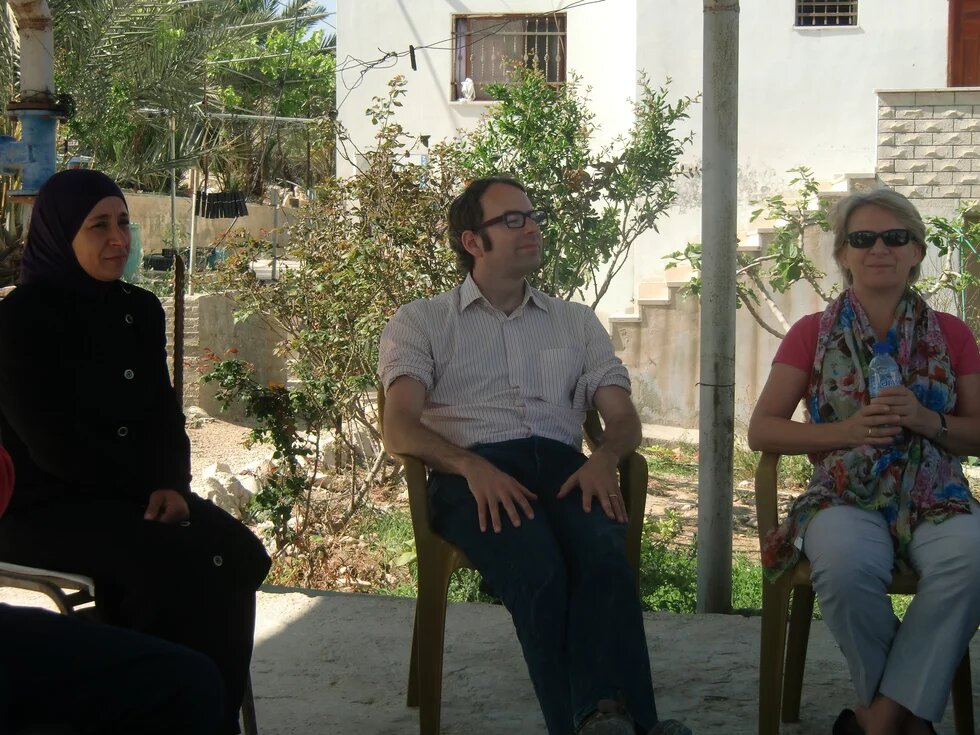
HBS organized a second field trip to the Jordan Valley, hosted by MA’AN Development Center . The day started with briefing on the current situation of the Palestinians in the Jordan Valley at MA’AN’s office in Ramallah, highlighting the threats to Palestinian communities located in area C. 62% percent of the West Bank is considered Area C , where according to the Oslo agreements Israel retains extensive control, including over security, planning and zoning. In addition to 50% of the Jordan Valley are being classified as Area C – covering 1200m² assigned to the regional council of the Israeli settlements in the area –, another 44,37% are closed off completely to the Palestinian inhabitants as they are declared either as border areas, military bases or natural reserves. This means that close to 95% of the Jordan Valley area are currently under exclusive Israeli control.
The field trip started with a stop at the Bedouin community of Ras al-Auja. Abu Hathem, a chief of the community, informed about the various problems for the residents, such as water shortages, lack of electricity, harassment from settlers and demolition orders by the Israeli army. The contrast of the dire humanitarian situation of these Palestinian inhabitants and the life in the nearby Israeli settlements, which are granted monopolized access to basic human rights, water, land and modern agricultural technologies, is striking. From Ras al-Auja, the group traveled north to the Palestinian community of Fasayil al-Foqa to meet with Khalid, a local resident who discussed the current challenges in his community, including flying checkpoints, lack of roads, lack of water, and military harassment. After their visit to Fasayil, the group was brought to Zbeidat for lunch and a brief overview of the situation in the village. On the way, they stopped at the Massu’a dump site to see the Israeli government’s mismanagement of settlement waste in the region. In Zbeidat, Barbara Unmüßig talked with the head of the village council, and the leader of the women’s committee. They discussed issues pertaining to land confiscation, settlement labor, building restrictions, and agricultural strangulation. Lastly, the delegation was brought to the herding community of Ein al-Hilwe in the al-Maleh region of the northern Jordan Valley. They were hosted by the head of the village council, who gave a walking tour of the region while pointing out historical sites along the way. Israel forbids Palestinians from accessing or restoring these historical sites. Surrounding the community, Israeli soldiers are regularly conducting military exercises, stationed just 400 meters from Ein al-Hilwe. The village council head discussed the problems with military harassment, settler land confiscation, water restrictions, and issues pertaining to construction.
Finally, Barbara Unmüßig visited the Wadi Hilweh Information Center and took a tour through the Palestinian neighborhood Silwan in East Jerusalem , which is home to ca. 55.000 Palestinians, guided by Jawad Siyam. Jawad is the director of the Information Center, as well as of the Madaa Silwan Creative Center. Silwan finds itself at the heart of the Israeli archeological project called ''City of David '', which led to the demolition of several Palestinian houses, as well as the destruction of a cultural center which was visited by the German Minister of Development Dirk Niebel only one week before the demolition . The local population is a target of gross human rights violations, some of the most severe being the repeated and numerous arrests of children living in the neighborhood. On the day of the visit, 28 local children had been in Israeli detention centers for a week. The Palestinian inhabitants of Silwan have to deal with frequent violence carried out with impunity by the Israeli settlers, ranging from beatings to the use of firearms and indiscriminately targeting adults as well as children. In addition to that, community leaders and peace activists regularly face harassment by the Israeli authorities. Jawad Siyam has been arrested several times by Israeli soldiers, including multiple times during the first four months of 2011 which he spent between house arrest and prison. He was cleared of all charges in 2011. Despite the worrying situation, Jawad Siyam is still convinced of non-violence and serving the community to resist the difficult living conditions of the Palestinian people in Silwan.
Walajeh, the Jordan Valley and Silwan represent three issues which are currently addressed with growing concern by the international community: The expropriation of lands in area C, the growing settlement communities in these areas and undermining the Arab character of East Jerusalem, all of which are increasingly endangering the possibility of the two state solution.